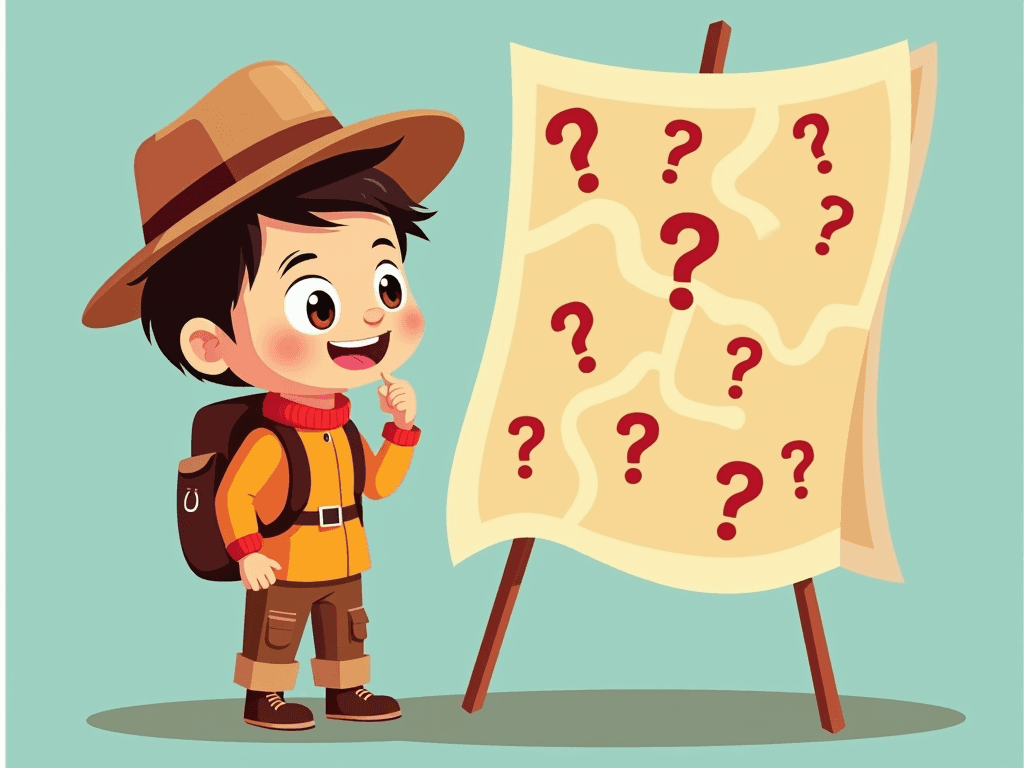Understanding Curiosity | TinyTraverse

Curiosity
Join the Emotion Explorers and learn about Curiosity! Fun activities and tips for kids ages 5-11 to develop emotional intelligence with TinyTraverse.
Introduction
- Imagine you see a path in the forest that you’ve never noticed before. You wonder what’s at the end. This is Curiosity at work! Learning to understand Curiosity helps us discover new things about our world. Welcome to TinyTraverse’s Emotion Explorers series, where we will uncover the wonders of Curiosity today!
Definition
- Curiosity is the desire to learn or know about something. It can feel like an itch in your mind that you want to scratch by finding out more. Imagine Curiosity as a small, bubbling spring of questions popping up in your mind, leading you on adventures of discovery!
Recognition Signs
- Asking a lot of questions about how things work.
- Feeling a little nervous and excited when thinking about new experiences.
- Noticing that your eyes widen or focus more when learning something new.
- Wanting to explore new places, books, or ideas.
- Experiencing a restless feeling when not understanding something completely.
Science Explanation
- Curiosity arises from the reward system in our brain. When we learn something new, our brain releases dopamine, a 'feel-good' chemical that makes us happy. This process encourages us to keep learning and discovering. When you feel curious, it’s like your brain is saying, 'This is exciting, let's learn more!'
Coping Strategies
- Ask questions: Make a habit of asking questions about everyday things. For example, 'How does this toy work?'
- Explore safely: Discover new places, like a park or a library, with a trusted adult.
- Keep a journal: Write or draw about things you are curious about each day.
- Play 'Curious Detective': Investigate by finding out facts and sharing them with a friend.
- Mindful observation: Spend a few minutes each day noticing your surroundings quietly.
Explorer Activities
- Treasure Hunt: Hide objects around a room and ask children to find them based on clues.
- Curiosity Journal: Have kids jot down questions they have about the world and explore answers.
- Mystery Object: Use a covered box. Place an object inside and let children guess what it is by asking questions.
- Science Exploration: Conduct a simple experiment, like growing a seed, to observe and note changes.
- Curiosity Walk: Take a walk in nature and ask children to notice and ask questions about what they see.
Story
- Once upon a time, in a tiny village, a young duckling named Daisy always asked, 'What’s beyond the pond?' Her little heart was full of Curiosity. One sunny day, Daisy ventured past the pond, discovering her first rainbow in the sky. Her feathers tingled with excitement!
Story Questions
- Why do you think Daisy wanted to explore beyond the pond?
- How did Daisy feel when she saw the rainbow for the first time?
- Is there a place you’ve always wanted to explore?
- What questions do you think Daisy might ask when she sees the rainbow?
Emotion Vocabulary
- undefined: Eager for knowledge. (Example: The inquisitive boy asked how the stars shine.)
- undefined: A feeling of amazement and admiration. (Example: She looked at the world with wonder and excitement.)
- undefined: To travel in or through a place to learn about it. (Example: They like to explore new parks on weekends.)
- undefined: To study with the purpose of discovering facts. (Example: We decided to investigate the strange noises in the attic.)
- undefined: Finding or learning something for the first time. (Example: The discovery of a new book at the library was exciting.)
Tips for Grownups
- Encourage questioning: Foster a safe space for children to ask any question.
- Model curiosity: Demonstrate your curiosity by learning something new.
- Share experiences: Talk about things you are curious about and investigate together.
- Be patient: Answer questions thoroughly and explore answers with them.
- Create routines: Incorporate curiosity-driven activities, like 'what if' discussions, into daily routines.
Interactive Quiz
Current Score: 0 / 1
What is curiosity?
Conclusion
- Curiosity is a wonderful emotion that helps us learn and explore the world around us. Keep asking questions and seeking answers as you grow! Dive into our other Emotion Explorers topics to continue your journey of emotional discovery!